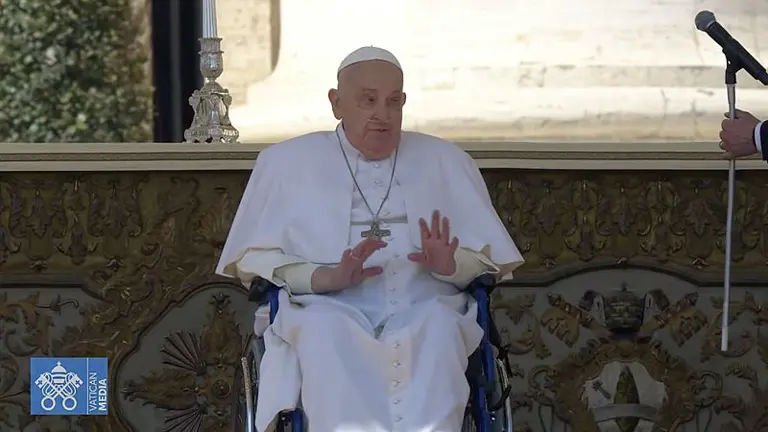Religion
The Effect of Tithing on Your Finances: Pastor Matthew Ashimolowo As a Case Study
Published
8 months agoon
By
Ekwutos Blog
Some days ago, I watched an interview with one of Nigeria’s most prominent prosperity preachers, who has previously said on camera that Scripture talks more about money than about things that are sacred to our faith (by that, he meant Christianity) and that God wants us all to prosper, and if we believe and practice what Scripture says, we will prosper financially.
He is one of the proponents of tithing, which he says if you pay, you MUST always prosper. He said all this on camera. His name is Matthew Ashimolowo. Instead of arguing with me, Google his video and watch it.
So, imagine my surprise when this fellow complained bitterly during the interview about losing large sums of money he invested in various Nigerian bank stocks. Please, instead of attacking me, watch the interview yourself. It is recent.
Then this man went on to complain about how he borrowed money from a bank and the bank sent people to the church he leads during service to intimidate him and get their money back.
He said the money he lost would be equivalent to billions today.
By Matthew Ashimolowo’s own confession in that interview, his personal life experiences contradict what he has been teaching about prosperity.
If tithing is the way to wealth and this prosperity Gospel is effective, why would Mr. Matthew Ashimolowo complain about losing such large amounts? Why will he borrow from a bank? Someone like him ought to be a lender, not a borrower.
I do not pay or demand tithes, yet I make serious money on the stock market. By the grace of God, I have the largest paid subscribers of any African on X, formerly Twitter, because I help my followers invest their money profitably.
Google my success with NVIDIA. When my subscribers invested, it was $435. They made times three of their money. That is just one in a very long line of successes.
For that and other reasons, I was named the most influential business person in Africa by Business Insider, which is close to being the world’s Number One business-focused magazine.
I am successful at this because I read voraciously, and then pray to God to open my eyes, and subsequently act in faith by applying the knowledge I have acquired, as though God has already answered that prayer.
Knowledge, when applied, will make you wealthy. This is why Scripture says:
“My people are destroyed from lack of knowledge.”-Hosea 4:6.
If I tithe but do not acquire knowledge, I would also lose money in the stock market, like Ashimolowo.
It is God Who gives me the power to make wealth, because of the principle of true knowledge. Which is why Yeshua said:
“You shall know the truth, and the truth shall make you free.”-John 8:32.
Tithing can never make you wealthy, and Matthew Ashimolowo’s experience in the stock market is a testament to that fact.
Tithing has NOTHING to do with financial prosperity.
One megachurch pastor even recently said if you don’t pay your tithe, your life is at risk. Today is Professor Wole Soyinka’s ninetieth birthday. He has NEVER paid tithe in his life. He does not even believe in God. Why was his life not cut short if what the pastor told you is true?
It is time to emancipate yourselves from being manipulated by religion.
If you do not pay tithes, your life is NOT at risk. Please fact-check me: As a nation, Japan has the highest average life expectancy of any country on Earth, with an average life span of 84 years. Yet, Christians make up only 1.5% of their population, and the vast majority of their Christians do not pay tithes. Meanwhile, Nigeria has one of the lowest average life expectancies on Earth, with the average Nigerian living for only 53 years. Yet, we are one of the most religious countries on Earth, with a large population of tithe payers.
How can a pastor tell you that your life is at risk if you do not pay tithe and you will remain in that place?
I have read Scripture in the original Hebrew, Aramaic, and Koine Greek languages. The word “devourer” in the King James Version of Malachi 3:11 is an agricultural term. It is common in agriculture. The devourer there just means an agricultural pest. It will be clear if you read that verse in the original Hebrew or a modern-day English version. Let me give you some versions:
“I will prevent pests from devouring your crops, and the vines in your fields will not drop their fruit before it is ripe,” says the LORD Almighty.”-New International Version.
“I will also stop locusts from destroying your crops and keeping your vineyards from producing.”-Contemporary English Version.
“I will rebuke the locust for you, so that it will not destroy the produce of your soil; and your vine in the field shall not be barren, says the LORD of hosts..”-New Revised Standard Version.
The King James Bible was written in 1611. Many words used in the KJV have different meanings today. For example, the word Africa is not used in the KJV. Instead, Africa is called Cush and Black peoples are called Cushites.
In 1611, agricultural pests were called devourers. That is why Malachi 3:11 in the King James Version says:
“And I will rebuke the devourer for your sakes, and he shall not destroy the fruits of your ground; neither shall your vine cast her fruit before the time in the field, saith the LORD of hosts.”
It does not mean that God will kill you if you do not pay your tithes.
The reason why agricultural terms are always used when referring to tithes in Scripture and the Bible is that tithes were an agricultural tax imposed on Jews from the eleven tribes other than the tribe of Levi and meant for the Levitical priests because they were not given a land inheritance when Moses divided up the promised land.
Even Yeshua, who we follow (not worship), did not collect tithes.
Yeshua Hamasiach (Jesus Christ) only mentioned tithes when He mentioned them strictly in agricultural terms and only to the Pharisees who were under the law. We see this in Matthew 23:23:
“Woe to you, teachers of the law and Pharisees, you hypocrites! You give a tenth of your spices–mint, dill and cumin. But you have neglected the more important matters of the law–justice, mercy and faithfulness. You should have practised the latter, without neglecting the former.”
There is no single instance of paying monetary tithes in Scripture.
The only alternative to agricultural produce was alcoholic beverages. We see this in Deuteronomy 14:24-26:
“But if that place is too distant and you have been blessed by the LORD your God and cannot carry your tithe (because the place where the LORD will choose to put his Name is so far away), then exchange your tithe for silver, and take the silver with you and go to the place the LORD your God will choose. Use the silver to buy whatever you like: cattle, sheep, wine or, other fermented drinks, or anything you wish. Then you and your household shall eat there in the presence of the LORD your God and rejoice.”
Why did God require the ancient Israelites to pay tithes of their farm produce?
Joshua 13:14 gives the answer.
“But to the tribe of Levi, he gave no inheritance, since the food offerings presented to the LORD, the God of Israel, are their inheritance, as he promised them.”
Many of these preachers like to cite Abraham as an other. Actually, Abraham did not tithe his income or his farm harvest. Abraham tithed ONCE. And he only tithed from military plunder, also called spoils of war, and we see this in Hebrews 7:4:
“Just think how great he was: Even the patriarch Abraham gave him a tenth of the plunder!”
The disciples and the early Christians never collected tithes. They took free will offerings-Acts 2:44-45. Not one person in the New Testament is recorded as paying tithes.
If a pastor justifies tithing using the Old Testament, ask them why they do not also justify polygamy since the Old Testament allows it-2 Samuel 12:8, or slavery-Deuteronomy 20:11, or other extreme forms of punishment for sexual offences-Leviticus 20:13.
Stop adjusting Scripture to your church and start adjusting your church to Scripture.
Now, let me pronounce a blessing on you. You and your household will not die if you do not pay tithes. My God shall bless you, and you are likely to live as long as a Japanese, as long as you are hardworking, avoid red meat, be family conscious, and maintain personal hygiene.
Reno Omokri
Gospeller. Deep Thinker. #TableShaker. Ruffler of the Feathers of Obidents. #1 Bestselling author of Facts Versus Fiction: The True Story of the Jonathan Years. Hodophile. Hollywood Magazine Humanitarian of the Year, 2019. Business Insider Influencer of the Year 2022.
You may like


PRESIDENCY DISCLAIMS 2027 CAMPAIGN BILLBOARDS NATIONWIDE


Ajofia Nnewi was billed to perform in a masquerade show in Lagos, Nigeria. But the real owners of Lagos through the commissioner of police banned Ajofia from stepping into Lagos State.


Adamawa: Hong people vow to resist Boko Haram attacks


Citizens Engagement: Jigawa Govt dismisses opposition parties concerns


Gombe: Correctional Service denies blocking Take it Back Movement from visiting detained official


Taraba: Residents of Mallam Joda call for urgent road rehabilitation
Religion
Alleged fake prophecies: Pastor gives 48-hour ultimatum to podcaster, KAATalks
Published
1 day agoon
April 12, 2025By
Ekwutos Blog
The Senior Pastor of Power World Ministries International, Rev. Dr. Uche Ume, has issued a 48-hour ultimatum to Mr. Kel Armstrong Amobi, host and producer of the KAATalks Podcast, over his claims that he was engaging in fake miracles.
The cleric demanded a full and public retraction of what he called defamatory statements made against him in videos posted on social media between April 8 and 9, 2025.
He spoke in a statement made available to Ekwutosblog through his legal counsel, Barr. Maxwell Opara.
Among other things, Amobi had claimed that, “There is nobody close to me that he hasn’t called, begging me to forgive him. But what he needs is to stop the staged miracles, false prophecies, and extortion.
“He is manipulating poor people in Ebonyi State, collecting money from children and their mothers.
“You’ve been ruining people’s lives with your so-called nonsense miracles and fake prophecies in Ebonyi, Aba, and other places. Do you know how many people may have lost their lives because of you?”
Rev. Ume’s legal team asserted that those statements were not only unfounded but had caused significant harm to his personal and ministerial reputation.
He said that failure to comply within 48 hours upon receipt of the letter, he would be left with no option but to explore all legal remedies available “to protect our client’s name and reputation.”
Religion
Daddy Freeze reacts as Femi Fani-Kayode lays hands on people in Church
Published
4 days agoon
April 9, 2025By
Ekwutos Blog
Media personality Daddy Freeze has reacted to a viral post of former minister of aviation, Femi Fani-Kayode laying hands on people in a church.
Fani-Kayode, popularly called FFK, had on Monday shared pictures from his thanksgiving ceremony on Sunday at the Faith Hill Prophetic Assembly in Piwoyi, Abuja.
The politician was seen laying hands on people during the church service. The development raised concerns among netizens.
Reacting to the development in an Instagram post, Daddy Freeze, who was surprised to see the pictures, told his followers to be close to their phones for them not to miss God’s call.
Sharing the photos, Freeze who sarcastically announced that God is currently on a calling mission, challenged his followers to also consider picking God’s call.
“God is truly working wonders in this generation. May His name be praised in Jesus name. God don call FFK o. God dey call o; hold your phone make e no be say God don call you you miss the call. If God never calls you, check yourself.”
Watch video below:
https://www.instagram.com/reel/DIJ9xjUiZP2/?igsh=NHl5em44MHg5eGk4
Religion
Pope makes surprise appearance during Mass in St. Peter’s Square
Published
1 week agoon
April 6, 2025By
Ekwutos Blog
Pope Francis made a surprise appearance in St. Peter’s Square on Sunday morning during a special Jubilee Mass for the sick and health care workers.
The pontiff, who was rolled into the square on a wheelchair, was making his first public appearance at the Vatican since being released from hospital two weeks earlier.
As he made his way to the altar at the square, he waved at the crowd. “Good Sunday to everyone,” said the pope. “Thank you from the bottom of my heart.”
The pope’s voice sounded louder and stronger than when he spoke outside Gemelli hospital on 23 March, the day of his release. He had been battling life-threatening pneumonia during a five-week stay there.
In an Angelus Sunday prayer written by the pope himself and read out by Archbishop Rino Fisichella, the pontiff said: “I pray for doctors, nurses and health care workers, who are not always able to work in adequate conditions and are sometimes even victims of aggression.”
“Their mission is not easy, and they must be supported and respected. I hope that the necessary resources will be invested in treatment and research, so that health care systems will be inclusive and attentive to the poor and the most fragile.”
He also thanked the inmates of Rebibbia women’s prison, who had sent him a card wishing him a quick recovery. “I pray for them and for their families,” he wrote, before wishing for peace in places affected by war, as well as more aid for Myanmar and Haiti.

PRESIDENCY DISCLAIMS 2027 CAMPAIGN BILLBOARDS NATIONWIDE

Ajofia Nnewi was billed to perform in a masquerade show in Lagos, Nigeria. But the real owners of Lagos through the commissioner of police banned Ajofia from stepping into Lagos State.

Adamawa: Hong people vow to resist Boko Haram attacks
Trending

 Trending6 months ago
Trending6 months agoNYA demands release of ‘abducted’ Imo chairman, preaches good governance
- Business6 months ago
US court acquits Air Peace boss, slams Mayfield $4000 fine

 Politics6 months ago
Politics6 months agoMexico’s new president causes concern just weeks before the US elections
- Entertainment6 months ago
Bobrisky transferred from Immigration to FCID, spends night behind bars
- Entertainment6 months ago
Bobrisky falls ill in police custody, rushed to hospital

 Politics6 months ago
Politics6 months agoRussia bans imports of agro-products from Kazakhstan after refusal to join BRICS

 Politics6 months ago
Politics6 months agoPutin invites 20 world leaders
- Politics1 year ago
Nigerian Senate passes Bill seeking the establishment of the South East Development Commission.

